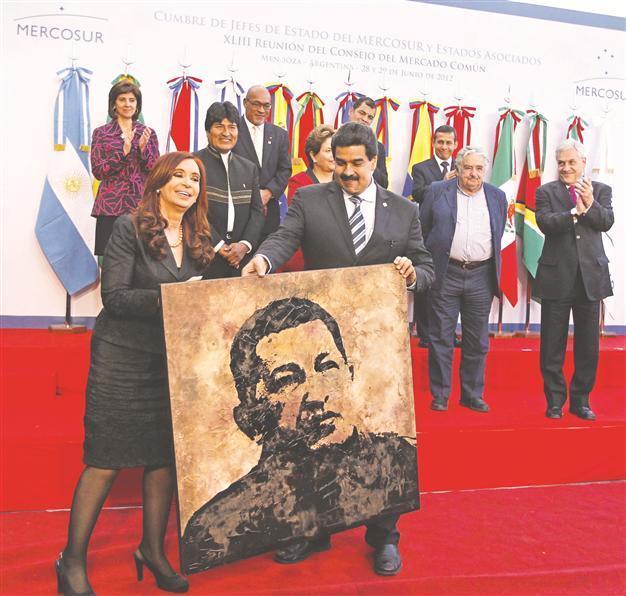Venezuela entering trade bloc raises questions
BRASILIA - Associated Press

Argentina’s President C. Fernandez de Kirchner (L) gives Venezuela’s Foreign Minister Nicolas Maduro a portrait of Chavez during an annual summit of the Mercosur. REUTERS photo
More than six years after Hugo Chavez first said joining Mercosur was Venezuela’s destiny, the presidents of Argentina, Brazil and Uruguay decided last week that his oil-rich nation would finally become the fifth full member of the common market.Venezuela holds the world’s largest crude oil reserves and the move potentially links the region’s top energy and agricultural suppliers.
But the decision at last week’s summit to welcome Venezuela into Mercosur after the leaders temporarily suspended Paraguay has brought questions about the move’s timing and legality. Such decisions must be unanimous under Mercosur rules, and Paraguay’s senate has long objected to Venezuela’s entry.
“Venezuela’s entry into Mercosur was carried out through an announcement ... but there’s no legal or diplomatic protocol that guarantees its entry. There’s nothing in writing,” said Paraguay’s new foreign minister, Jose Felix Fernandez.
Fernandez assumed that post after President Fernando Lugo was impeached by Paraguay’s congress, which led other Mercosur countries to criticize the action as an “institutional coup” and suspend Paraguay’s membership.
Venezuela’s foreign minister, Nicolas Maduro, responded that his country has indeed achieved status as a full Mercosur member after years as an associate member. “Now the legal step will be taken,” he said.
The full deal still needs to be signed July 31 at Mercosur’s next meeting in Rio de Janeiro. But despite vows of challenges in international courts by conservative lawmakers in Paraguay and Uruguay, some analysts say the move was legal - even if it was opportunistic.
“This was a decision that had the consent of three presidents,” said Antonio Jorge Ramalho, a professor of international relations at the University of Brasilia. “According to Mercosur statutes, decisions are taken by consensus within the bloc.”
















